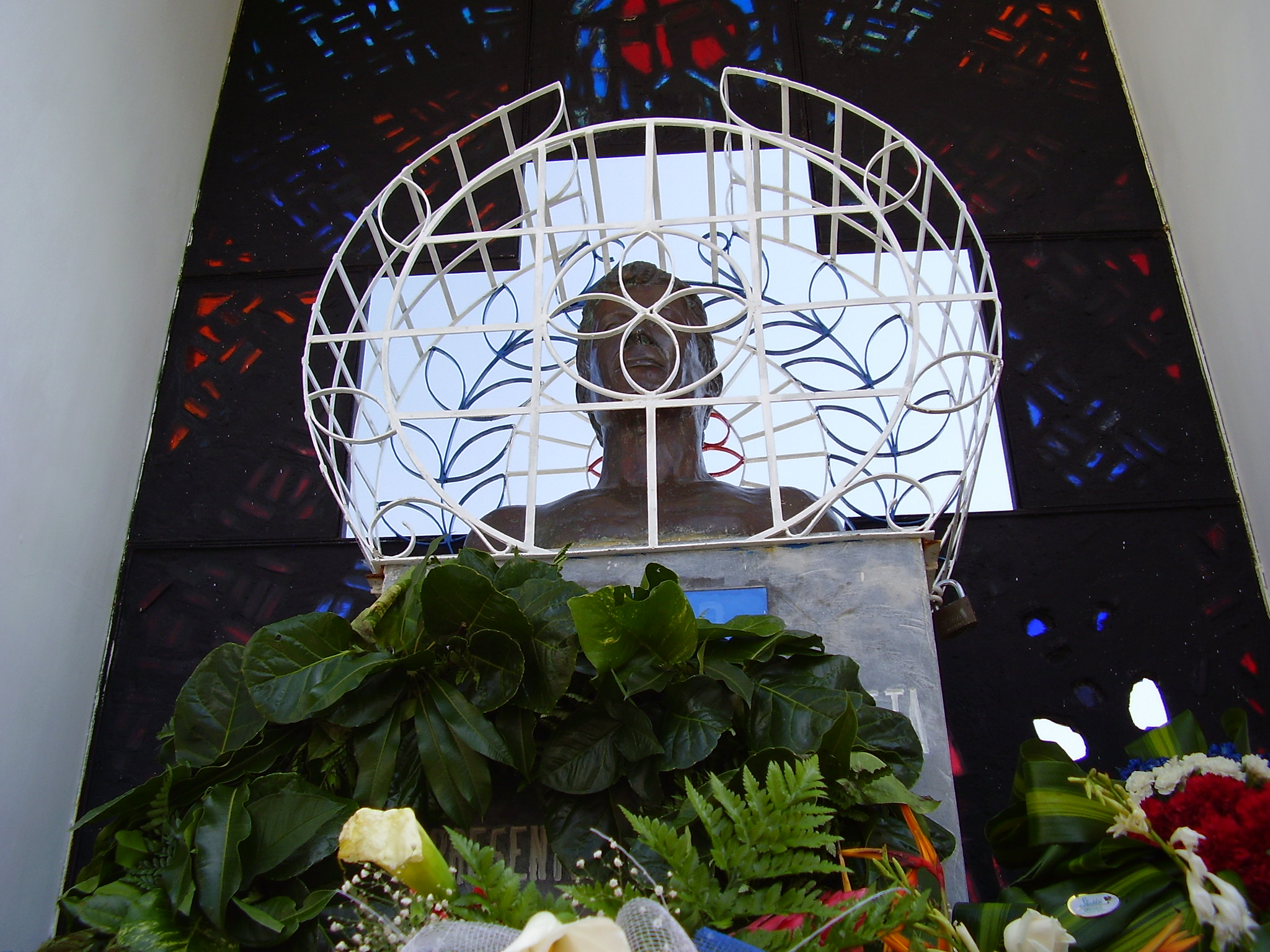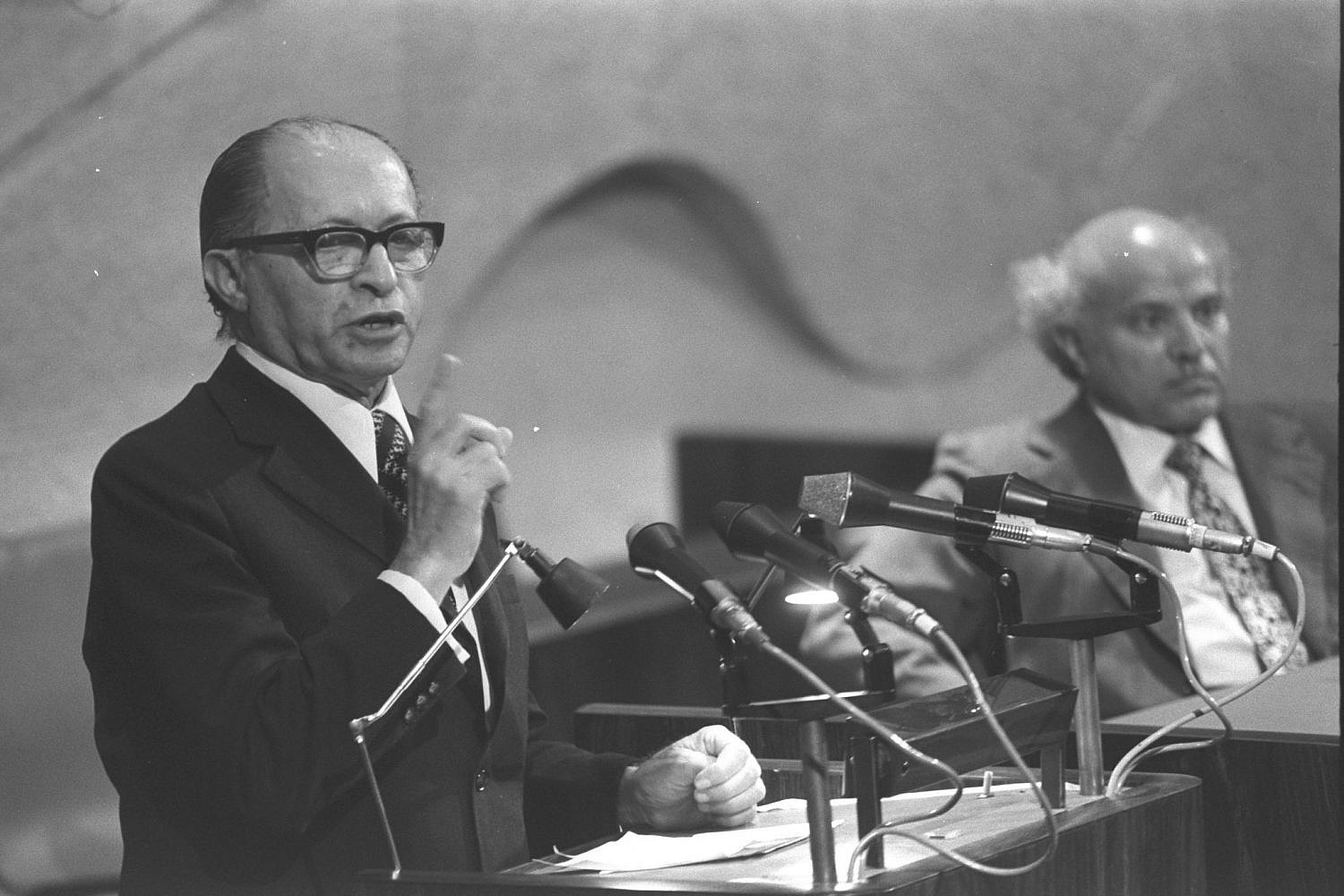No one should be surprised by the recent meeting between Israel’s ambassador to Romania, Reuven Azar, and the leader of the far-right Alliance for the Union of Romanians party (AUR), George Simion — an encounter that has drawn outrage from some Israelis and diaspora Jews.
The AUR is well known as a fascist, antisemitic party that glorifies Romania’s World War II-era leader, Ion Antonescu, whose regime oversaw the extermination of about 400,000 Romanian Jews. It is a small but vocal party, which won roughly eight percent of the vote in the last election.
While the full contents of the meeting have not been made public, it was presumably at least partly connected to Israel’s ongoing efforts to persuade Romania to move its embassy in Israel from Tel Aviv to Jerusalem. In 2018 and early 2019, Israel was able to get public statements supporting the relocation by the then-Romanian prime minister and the speaker of parliament. However, the Romanian president blocked the move in late 2019, saying that such an action would not happen without a joint decision in the European Union.
Israel’s ties with far-right and antisemitic regimes and parties have garnered greater attention in recent years, with particular focus on Prime Minister Benjamin Netanyahu and his ties to like-minded autocrats like Hungarian Prime Minister Viktor Orbán. The Israeli government’s interests — to break the EU’s consensus on various policies, including its opposition to moving embassies to Jerusalem — align well with the European far right’s desire to create conflict with Brussels, and to stir up nationalist sentiments by advancing policy decisions that contradict those of the EU.

But these kinds of relationships existed long before Netanyahu’s governments, serving as a way to advance Israel’s diplomatic, economic, and military interests. Israel even had relations with Romanian dictator Nicolae Ceaușescu, who ruled from 1965 to 1989, despite his and other Romanian officials’ clear antisemitic positions that were well known to Israeli diplomats.
Overlooking the death squads
Another historical example demonstrates a similar approach to foreign relations by the Israeli government. Recently declassified documents in the Israel State Archives reveal similar conduct in the midst of the civil war in El Salvador in the early 1980s: while masses were arrested, kidnapped, tortured, murdered or disappeared by the U.S.-backed regime, Israel campaigned to convince El Salvador to move its embassy from Tel Aviv to Jerusalem.
In a telegram dated June 10, 1982, sent to the Foreign Affairs Ministry in Jerusalem, the Israeli ambassador to Guatemala, Moshe Dayan (different from the Israeli statesman of the same name) reported on his trip to El Salvador as part of the effort to relocate the embassy. Dayan wrote that he met Roberto D’Aubuisson, the founder and leader of the far-right party ARENA, who served as president of El Salvador’s Constituent Assembly.
Like the Romanian AUR, D’Aubuisson and ARENA had a history of fascist and antisemitic statements, yet Dayan explained that D’Aubuisson “denied on his own initiative the statements attributed to him about the Jews and the Holocaust.” But, unlike AUR, ARENA followed through on its fascist beliefs through violent practices, such as the use of death squads to eliminate opposition and leftist activists, academics, journalists, and thousands of other civilians.
Israel clearly knew these atrocities were happening. Three months before Ambassador Dayan’s visit, in a report prepared for the Foreign Affairs Ministry, Israel’s former ambassador to El Salvador, Yaacov Deckel, wrote that he arrived in the country in March 1982 to act as an observer in the elections, in which ARENA secured about a third of the seats in the Constituent Assembly. Deckel noted that about 33,000 people had been killed, most of them innocent civilians, during the last three years of civil war.
Deckel also reported that he met with D’Aubuisson, “who approached me as an old acquaintance,” and said that “here in El Salvador communism will be buried.” Deckel added that the death squads connected to ARENA are “responsible for the physical elimination of many political opponents, including El Salvador Archbishop Romero,” and that the leaders of the party promised during their election campaign to “destroy all communists with napalm bombs.”

Nonetheless, Israel’s diplomatic campaign was successful, and, in August 1983, El Salvador announced that it would move its embassy to Jerusalem. This was defined in the Foreign Ministry telegrams as Israel’s most important achievement in all of Latin America that year.
Propping up apartheid
While Israel’s ties to the global far right understandably receive a great deal of attention — including by critics who argue that it shows Israel’s hypocrisy and true face when it comes to questions of antisemitism and fascism — not enough attention is given to Israel’s relations with parties to the left of the extreme right, which are actually the parties that have been in power in most European countries for the last decades.
These mainstream European parties criticize, to varying degrees, Israel’s policy toward the Palestinians, while their associated workers’ unions and human rights organizations often criticize Israel and directly or indirectly provide humanitarian aid to the Palestinians. But, almost without exception, these political forces still allow Israel to maintain the status quo of apartheid, support Israel through votes in international forums, and endorse the signing of agreements of enormous economic significance for Israel. As such, the rhetorical condemnations are never backed up by real actions and sanctions.
An example of this sad reality was recently revealed in declassified telegrams from Israel’s relationship with the U.K. The Conservative Party governments of the 1980s were diplomatically closer to the Arab states and even the Palestine Liberation Organization, and were among the harshest public critics of Israel in Europe; yet behind the scenes, Israel felt that it could do whatever it wanted, and did not hesitate to present this no-holds-barred position in closed meetings with British representatives.
According to a summary of a meeting on Feb. 18, 1980, between Israeli Prime Minister Menachem Begin and British Ambassador to Israel John Mason, Begin criticized the U.K.’s position regarding the lack of progress on the Palestinian issue since the Camp David Accords with Egypt; trying to shift all responsibility to the PLO and its leader Yasser Arafat, Begin argued that Israel “gave sacrifices for peace, just one example: the oil fields [in the Sinai Peninsula]. This concession will manifest itself in the expenditure of 2 billion dollars next year for the purchase of oil.”

According to a telegram sent four days later, on Feb. 22, the director of Israel’s Foreign Affairs Ministry met with British Minister of State for Europe Douglas Hurd. When Hurd expressed that the U.K. was concerned about Israeli settlements in the occupied territories and struggled to understand Israel’s position regarding water sources in those areas, the Israeli official likened the situation to “one basin of water used by both parties like a bottle with two drinking straws.”
Notwithstanding British politeness — or Britain’s long history of colonial exploitation — both Hurd and Mason should have angrily knocked on the table and told the Israelis that the “oil” and the “water bottle” were not theirs. Of course, no such thing ever happened. It is no wonder, then, that for decades Israel and its settlements have not hesitated to rob the West Bank’s land and water resources, nor feared any consequences for confiscating or destroying water tanks belonging to Palestinian communities who are actually denied control over and access to their own resources — conditions that remain in place to this day.
‘Masochistically testing its friends’
In a declassified “top secret” telegram dated April 23, 1980, sent by the Israeli envoy in London from a meeting “not to be quoted” with a British diplomat (neither name is specified), the British diplomat explained: “Sometimes one gets the impression that Israel is masochistically testing its friends to see how far they could go with it, even in an unreasonable way.”
The Israeli diplomat, meanwhile, understood the view from the U.K. to be: “As long as our [Israel] actions have a reasonable security basis, there is at least understanding among friends, if not agreement … But when we [Israel] stop basing the settlements only on security grounds and when we take steps that are perceived as demonstrative and provocative, such as settling houses in Hebron, we are causing damage to friendship and understanding with our own hands.”
In other words, as long as Israel justified its actions with security needs only — never mind if they were real or not — Britain would be able to live with Israel’s systematic violations of international law and human rights.
Most read on +972
The actions of the current Israeli government and its public affinity with the far right are now challenging the “masochistic” system that has been working to Israel’s advantage for decades. For this government, the “new” Israel needs no more excuses of real or fake security needs, and can instead expose its whole agenda as being based purely on an ideology of apartheid and Jewish supremacy.
This is why we should be concerned not only about Israeli officials’ meetings and links with far-right groups like Romania’s AUR, but also with the Conservative and Labour parties in the U.K., the Labour party in Norway, the Christian Democratic Union party in Germany, and other European mainstream parties. All of them, in parliament and in government, are effectively collaborating with Israel’s ongoing crimes against the Palestinian people.
Indeed, despite all the racist and authoritarian statements and policies made since the inauguration of Netanyahu’s current government in December 2022, apart from reducing invitations to Netanyahu and his ministers for official visits, there have still been no sanctions or real change in cooperation with Israel. Interests and business continue as usual. Instead of staying in a hotel in Paris, Netanyahu is simply staying in one of the most expensive suites in Jerusalem — not a heavy price for a man responsible for crimes against humanity.




